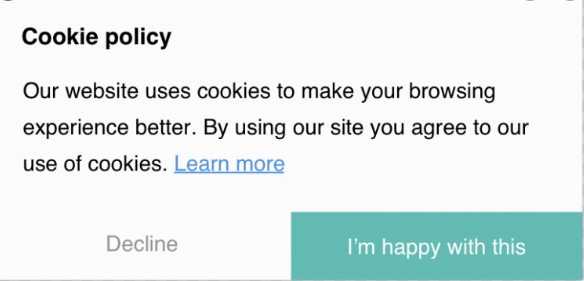How Cookie Data Transforms Marketing


When you visit a new site, you might notice a pop-up similar to the one pictured here. We’re talking about cookies, and not the delicious kind your grandma makes. These cookies are the kind that has turned the browsing experience into a personal, endless flow of relevant information by gathering data on your browsing activity. Because of cookies, marketers heavily personalize your advertisements.
But how exactly do these cookies work, and what makes them so special? Let’s explore the ways data is used for personalization through social media and email marketing, and how to use the data effectively.
How Cookies Work
When you accept cookies on a website, you provide the site owner with access to information that allows them to track your activity in multiple ways including:
- Counting the number of times you visit their site
- Identifying the specific device(s) you are accessing their site from
- Tracking your browsing activity
- Collecting and storing your data to create targeted ads and promotional offers
Once the site owner captures this data, there are various ways this data can be utilized. Curious how a site keeps the items in your shopping basket weeks after you’ve forgotten about it? You can thank cookies for tracking (and encouraging) your shopping habits.
Using data for Digital Marketing
Paid digital advertising allows you to reach your desired target audience in a strategic and efficient manner. When creating a target audience for digital ads, Facebook and other platforms provide you with the capabilities to narrow and broaden your audience based on specific interests. Many people will question how Facebook knows that they just searched for a new oven, parenting tips, or fall activities. But, it’s because of cookies.
Facebook decides which ads to show you based on a variety of qualifications, including:
- The pages, ads, and links you interact and engage with frequently
- Your Facebook profile information
- Information shared by advertisers that they have already acquired such as your email address
- Activity on connected websites and apps
The bottom line: Marketers have the power to tailor your browsing experience to show you products and services that you are interested in. Just as Facebook allows marketers to use the platform to provide relevant ads to target audiences using its data, Google, Twitter, LinkedIn, and all other social media platforms are doing the same.
Using Data Wisely
Data makes it possible for businesses to address you by your first name, know when you last used their app, purchased a product, or how many times you’ve visited their websites. Using these data points, marketers can create automatic email sequences, offer you promo deals based on your time away from their website, and determine if their newsletter was enticing to buyers based on filters and specific interactions (or the lack thereof).
Your social media or email inbox is full of promotions and advertisements personalized to your interests and activity thanks to data. This makes your individual internet experience more relevant and interesting. However, while data has made marketing more effective for almost everyone. not everyone uses the data appropriately.


Used inappropriately, personalized marketing can make your audience feel violated. The goal of personalized advertising is to deliver value, not spam. In Netflix’s “The Social Dilemma,” former tech giant and social media employees expose how some of the biggest companies are using data to keep us addicted to our email, social media, and internet browsers. Due to the misuse of data and historic breaches, users are becoming far more cautious than ever before. This has only increased the need for a personalized and deliberate marketing strategy.
At MCG, we use data wisely to deliver strategic and effective marketing strategies that turn leads into customers. Need to up your advertising game? Let’s talk.









